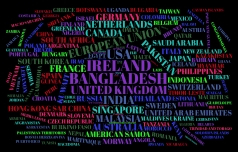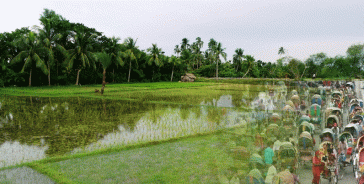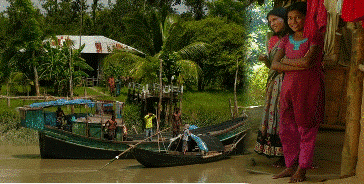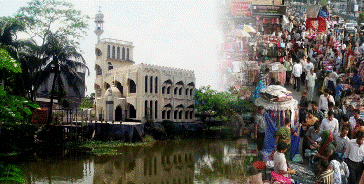[Heading: bideshi = foreigner; biday = goodbye; BD = Bangladesh.] Over the past month or so, thoughts of leaving have been weighing heavily on my mind. It’s with sadness, and I must admit a certain degree of happiness and anticipation too, that I’m getting ready to bid farewell to Bangladesh. The sadness that I feel is testament to the fact that I am going to miss this place. There is no doubt about that.
I think that what I’m going to miss most is the density and intensity of experience: that sensation of being swept up in the flux of everyday life; that feeling of being truly alive. I’ll miss the buzz from the constant, often chaotic, opportunities to interact and communicate. I’ll miss the warmth of the people and the richness and colour of Bangladeshi culture.
A story of two halves
 What a year it’s been! I could try to write a succinct, reflective summary on my experiences over the past thirteen months in Bangladesh. But it’s too soon: I will need time and distance to fully distil the essence of this year of living differently. There are conflicting emotions that are too complex to unravel just now. If you have been reading this blog, you will know that an element of reflection runs through it. You will know too that I am not one for arriving easily at neat conclusions. Life’s just not like that, for me at any rate.
What a year it’s been! I could try to write a succinct, reflective summary on my experiences over the past thirteen months in Bangladesh. But it’s too soon: I will need time and distance to fully distil the essence of this year of living differently. There are conflicting emotions that are too complex to unravel just now. If you have been reading this blog, you will know that an element of reflection runs through it. You will know too that I am not one for arriving easily at neat conclusions. Life’s just not like that, for me at any rate.
And so the story of my time in Bangladesh is primarily one of two halves: my life at work and my life outside work. I can’t (well, I could but I won’t) deny that my work situation was particularly difficult and disappointing: it was. I have written in some detail, and reflected at length, about my work and about my thoughts in relation to volunteering and development in posts 25 and 48. I won’t dwell on the story of my work placement here. Suffice it to say that I learnt much about ‘development’ and ‘work culture’, though perhaps not always in ways I expected. And it wasn’t all bad: there were those patches of silver lining between the dark clouds of despair.
From the unfamiliar to the familiar
It’s astonishing how in just thirteen months there are so many things that I now take for granted, that were ‘foreign’ to me when I first arrived. It is true that I had been out of Ireland for longer periods prior to arriving, but this was the first time that I had lived and worked in one country for so long. Now, thirteen months later, I can’t imagine not wearing a shalwar-kameez. There are many Bangla phrases that I no longer have to think about: they feel familiar on my tongue. I find it normal to hook up with a complete stranger on the street and head off to a tea stall for a chat and a cha. I do the ‘run and jump’ to catch the bus. I no longer think my feet are darkly tanned: I’ve become acclimatised to the layers of dust that wash off in the shower. I expect the call to prayer at certain intervals. My week starts on Sunday. I open doors, cupboards and drawers warily and expect to see scuttling cockroaches. I automatically look down when I walk (to avoid holes, etc.). I unthinkingly grab my bottle of filtered water to brush my teeth. I would feel uncomfortable sleeping without a mosquito net. I hop into rickshaws at the drop of a hat. I take incessant attention for granted. I have got used to ‘waiting’. I’m long enough here to have forgotten how to feel impatient. I have come to expect that I will always be part of a crowd, even in a tranquil rural landscape. I would be surprised if traffic lights functioned normally. I am ready for regular power cuts. I check the sugar bowl for ants before dipping my spoon. Cold showers are customary. I am used to being the only white face in a sea of brown ones. I routinely check that I have paperweights in place before turning on a fan. I accept that cornflakes cost €5. I don’t bat an eyelid at matching, floral, china cup-and-saucer sets in unexpected settings. Privacy is a myth: I can no longer imagine being in a quiet place by myself. I could continue at length: it amazes me how adaptable we human beings are. I’m not sure when or how exactly these transformations occurred: just living in this new culture necessitated a refocusing of my lens.
People and places
My warmest memories of Bangladesh will undoubtedly relate to people and places. First and foremost there’s Dhaka, this demanding city that has consumed so much of my energy. In return, it has gifted me with a vibrant and intensely dynamic experience of living. I have an overflowing treasure trove of powerfully vivid memories. In a short time I moved from being overwhelmed by Dhaka to being totally engaged – mind, body and soul. Yes, I will miss Dhaka deeply.
Each and every journey out of the city to rural Bangladesh was unique and special. I was enthralled by the endless entanglement of rivers in this ever-changing land that is defined by water. I never thought I was a person of the plains before but Bangladesh changed that. The beauty of the landscape will linger – rivers, chars, rice paddies, tea estates, forests, mosques, temples, villages, mangroves, jungle creeks, beaches, hills and even a coral island. All of these places are shot through with the rich and colourful culture of Bangladesh, as exemplified by diverse ethnic groups, local traditions, melas, history, music and the arts.
But that’s only half the story. It was the people that I met on each step of my journey that animated my experiences and helped me to discover this place and make it familiar. I’ve written often of the extraordinary wealth of generosity and kindness here. Over this past year so many people have warmly invited me into their lives. We’ve talked and laughed and shared stories. They’ve helped me to understand and overcome challenges. Sometimes, communication was limited to gestures, eye contact and affectionate (and infectious!) smiles. Above all, I’ve learned so much from so many fine people. There are the friends that I have made in Dhaka, my colleagues and the children near my workplace, the people in my neighbourhood in Lalmatia, those I connected with during my travels and the frequent, random encounters in my day-to-day life in the city.
Navigating intercultural waters
Uncertainty is always a factor when charting unknown waters and I had a certain degree of trepidation before I arrived in Bangladesh. Would I be able to make the transition from ‘traveller’ to ‘resident’? What would it be like to live in a Muslim country? How would I cope with the crowds? Would I be able to adapt to the culture? What about the poverty? And the floods? Would it be dangerous living with political unrest? And what about the corruption? I think differently now and would have no hesitation returning.
Yes, it is true that there is real need in Bangladesh, but it is not the kind of utter, widespread deprivation that media images might lead us to believe. (See post 30 on ‘Poverty’.) In any case, it seems to me that extreme wealth is as detrimental to the core of mankind’s humanity as extreme poverty. However, it is a fact that huge gaps remain in areas such as nutrition, health-care and education. And of course the many disasters, natural or otherwise, are just that, sadly. But the situation is continuously changing, and while there is still a lot more to do, large-scale challenges are being tackled and overcome, as you will have read elsewhere in this blog.
I have written too about the country’s international reputation for corruption. (See post 51, amongst others.) And while it is true that corruption is rife in the country’s echelons of power, it is not true of the average person who lives here. (With talk of the possibility of the IMF intervening in the crisis back home in Ireland, the international financial crisis with the banks, and the corruption at so many levels, one has to wonder about the transparency and corruption ‘indices’ and the ‘developed’ world.)
What I have struggled most with here is the politics of fear: the hierarchical nature of the relationship (based on fear) between those in power and those who are powerless, and the abuses of human rights that emanate from these relationships. I’ve struggled deeply with ideas around cultural difference, cultural relativity and cultural sensitivity in this regard. There is no doubt that in this respect, Bangladesh can be a difficult country to live in. (See posts 33, 35, 44, 51, and 57 amongst others.) (This is not to say that Bangladeshi culture is all bad, or that Irish culture is all good for that matter. Neither statement would be true.)
Finally
It is important to acknowledge that I can’t profess to really know and understand the culture after just thirteen months. That would take a life-time and an in-depth knowledge of the language. I can sense though that there is a huge repository of optimism and creativity in Bangladesh. Asha (hope) abounds. The problems here will be best solved by the people here, particularly the younger people who have grown up post the military juntas. I have been told this throughout Bangladesh: there are many good people going into politics now for the right reasons. If they can replace the old corrupt elites, the country will have a real chance.
For me, my year here has been an incredible adventure. Yes, it was a struggle at times, a challenge at times and frequently downright frustrating. But more often than not it was exciting, intense, colourful and surprising, full of warmth and a deep and enriching learning experience.
Thoreau said:
Nothing makes the earth seem so spacious as to have friends at a distance; they make the latitudes and longitudes.
I didn’t know anybody in Bangladesh, or from Bangladesh, before I came here, but it’s firmly on my world map now.
I find myself wondering if I’ll ever return. I would like to be able to say ‘abar dekhe hobe’ (see you soon). I don’t know for sure, but what I can say is that Bangladesh will always have a special place in my heart.
(P.S. A couple of hours ago I found myself wondering if I’d ever leave Bangladesh. I’m writing this in the early hours of the morning in Dhaka Airport. Usually, at the end of assignments, volunteers are provided with transport by VSO to take them to the airport. I had arranged all this beforehand and sent numerous reminders, but I began to have niggling doubts as I waited and waited… Thankfully, I still had the emergency number for VSO and phoned at 2.45 a.m. (I would have got a taxi myself, but at that hour the streets were quiet and I was afraid I mightn’t succeed in hailing one in time.) About 20 minutes later, a frantic staff member from VSO arrived in a clapped-out, small, blue ‘taxi’. The rear doors didn’t open and the boot was tied with a piece of string. I had to squeeze into the back beside my luggage, with my backpack sticking out the window. As we sped through the warm night along the dusty streets of Dhaka I couldn’t help smiling: drama to the very end!)

Farewell for now,



 On March 15th 2009 I left Ireland to spend 13 months in Bangladesh as a
On March 15th 2009 I left Ireland to spend 13 months in Bangladesh as a 







 I am especially conscious that I am writing about an Eastern culture from the perspective of a Western observer. The opinions expressed are my own - unless otherwise stated. Should you perceive inaccuracy or misrepresentation, in this regard or in any other, or you would like to add something, I would welcome your observations. Leave a comment below the relevant post(s).
I am especially conscious that I am writing about an Eastern culture from the perspective of a Western observer. The opinions expressed are my own - unless otherwise stated. Should you perceive inaccuracy or misrepresentation, in this regard or in any other, or you would like to add something, I would welcome your observations. Leave a comment below the relevant post(s).